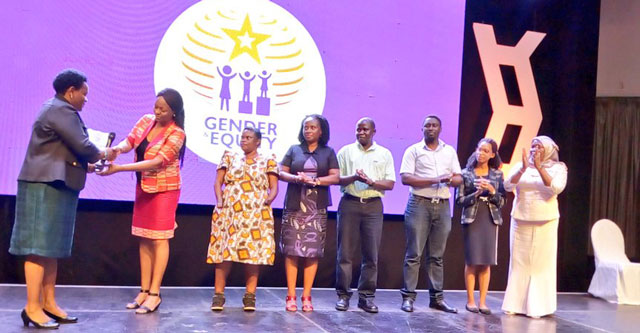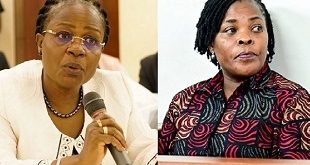
Kampala, Uganda | THE INDEPENDENT | Forum for Women in Democracy (FOWODE) has been recognized for their pioneering role in advocating for Gender Responsive Budgeting (GRB) in Uganda.
FOWODE were Wednesday night announced winner of a prestigious award by the Equal Opportunities Commission in the category of Civil Society Organisations. They were recognized for “the most outstanding contribution towards Gender Responsive Budgeting (GRB) in Uganda”.
“The institutionalization of GRB through legislation provides the undying hope that GRB has a bright future in Uganda,” said Patricia Munabi, Executive Director FOWODE, before adding that ” Therefore, as we celebrate our success as FOWODE and the Women’s movement broadly, we should be cautious of the challenges that still abound. Non-compliance to GRB could eventually impede Uganda’s ability to achieve the sustainable development goals.”
She thanked Equal Opportunities Commission and UN Women for providing the platform that highlighted their tireless efforts over the years towards Gender Responsive Budgeting.
Through GRB work, coupled with participatory planning processes, individual community members have found opportunities to participate in budget debates and influence budgeting in their districts.
“Gender and Equity budgeting is very critical because it addresses the needs of the marginalized to ensure sustainable inclusive growth. As a result, women and other marginalized groups will be able to step up and achieve much much more,” said Angella Kizito, Communications Officer at FOWODE.
In their statement, Forum for Women in Democracy, thanked all their members, staff, partners and friends who have in one way or another supported the vision since it’s birth.
For two decades since 1998, FOWODE has been at the forefront of efforts to establish gender responsive budgeting (GRB) in Uganda.
It started with a pilot research project at the national level for three sector budgets and policies for Agriculture, Animal Industry and Fisheries, Education, and Health.
FOWODE and the GRB journey
FOWODE’s decision to start GRB activities in Uganda was based on a 1997 resolution reached by a Special Interest Group (SIG) Caucus meeting in the Parliament of Uganda in August 1997.
In 2004/5 the Uganda Government officially named GRB as gender and equity budgeting (GEB) in the Budget.
Unlike in many other countries, Uganda has since enacted a law, the Public Finance Management Act (PFMA), 2015 that compels government MDAs to implement mandatory gender and equity budgeting.
The enactment and other earlier and later developments such as the establishment of the Equal Opportunity Commission (EOC) , mandated to pursue GEB compliance in government, have strengthened the hand of government in promoting GRB.
The long battle for equity
The year 2012 is historic, because when the government of Uganda brought the Public Finance Bill to Parliament, FOWODE with the support of the Speaker, the GRB Champions and CSBAG led an intensive campaign to ensure that the bill provides more opportunities for citizens
Intensive advocacy activities followed with partners, MGLSD, the EOC, UWOPA and especially GRB Champions in Parliament.
The engagements included holding strategic meetings including with the Speaker of Parliament and involving the media in extensive publicity of the engagements.
Three strategic committees of parliament that were crucial in handling the Public Finance Bill were particularly targeted, in what came to be known as the “Tripartite Committees”. Members of the Tripartite were the Committees on the Budget, Finance and Natural Resources. Equally engaged was UWOPA. Through these and other processes, FOWODE persuaded the MPs to sign a commitment to support the Certificate of Gender and Equity (CGE) proposal.
As a result, the proposal was adopted by the “Tripartite Committees” report to parliament, which inserted the requirement for the Certificate of Gender and Equity (CGE) in the Public Finance Bill. Eventually, the Public Finance Management Bill of 2012 was passed in December 2014 and enacted in March 2015 as the Public Finance Management Act (PFMA) of 2015 with the Ministry of Finance in charge of issuing the CGE – that has been translated in the leading local languages.
Section 9 (6a) provides that the Minister of Finance, in consultation with the Equal Opportunities Commission (EOC) shall issue a Certificate (a) certifying that the budget framework paper is gender and equity responsive and (b) Specifying measures taken to equalize opportunities for women, men, persons with disabilities and other marginalised groups.
We would like to congratulate @FOWODE_UGANDA for winning the award for the Civil Society Organization with the most outstanding contribution towards Gender Responsive budgeting. Credit to their team who have seen out the vision & @unwomenuganda for providing the platform. pic.twitter.com/rjghFU7FX8
— Women Human Rights Defenders Network- Uganda (@WHRDNU) October 31, 2019
Global first
The enactment of the PFMA 2015 with GRB provisions qualified Uganda as the first country globally to have such a certificate embedded in the law that provides for an enforcement and accountability mechanism.
Sector Budgets and Ministerial Policy Statements that are non-compliant are to be rejected by Parliament in accordance with Section 78 (1) and (2) of the PFMA, 2015.
However, despite this promising move, barely six months after the bill was passed by Parliament and assented to by the President, Cabinet tabled amendments that included a proposal to repeal the CGE for the Ministerial Policy Statements, which is the most useful since the National BFP masks sector performance. This move was based on the erroneous view that complying with the CGE was very laborious and would delay MDAs’ completion of their BFPs thus causing delays in meeting budgeting deadlines.
FOWODE lobbied Members of Parliament including the Finance and Budget Committee and GRB Champions in the house to reject the proposal. FOWODE also used interactive discussions on radio and television to launch a one-month campaign. These efforts coupled with the advocacy of the EOC ensured that the provision was not repealed.
Subsequently, Parliament rejected the proposal and the Certificate of Gender and Equity (CGE) was retained in the PFMA, 2015. Repealing the CGE provision would have been inconsistent with the principles of gender and equity budgeting that FOWODE had been advocating for since the late 1990s.
 The Independent Uganda: You get the Truth we Pay the Price
The Independent Uganda: You get the Truth we Pay the Price


